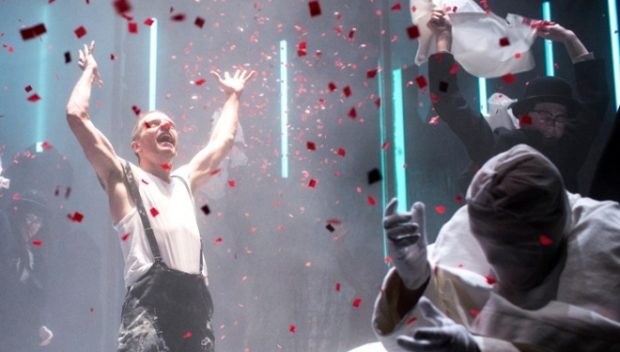You have no items in your cart. Want to get some nice things?
Go shopping
It has been over 400 years since the publication of Dr Faustus, Christopher Marlowe’s tale of damnation, but Maria Aberg’s modern dress adaptation shows that these themes are still relevant today. Aberg’s production is an ambitious take on this tragedy that is, in the main, engaging and intelligent; at times, however, it strays from the integrity of Marlowe’s text and is somewhat superficial.
The play starts with the actors Sandy Grierson and Oliver Ryan facing each other and lighting a match, to determine who will play the doomed doctor and who will play Lucifer’s henchman Mephistophilis. The one whose match goes out first plays Faustus. On press night this was Grierson.
This is a clever device, making central a sense of Mephistopheles being a psychical part of Faustus. Aberg underscores this idea by casting two actors who look similar and whose movements mirror one another. The point is clear: evil and the potential for damnation lies within. This is an idea that would have resonated with contemporary audiences, aware of debates raging around the Calvinist view of predestination, and is just as effective in the present-day. While the fear of damnation has been largely lost, we are all aware of our potential to to give into our baser desires and alienate ourselves from others. Aberg was right to emphasise the interconnectedness of Mephistophilis and Faustus.
Aberg, however, pushes this point too far, painting Mephistophilis and Faustus’s relationship as an eroticised one, with Mephistophilis – slinking around the stage like a predatory lion, with his six-pack out – depicted as the seducer. This is distracting and gives into the reductive and prevalent view (in certain circles) of evil essentially being a wanton sexuality. This is repeated elsewhere in the depiction of the deadly sin of Envy as a sexy dominatrix and the devil as a voluptuous blonde who would eat any man for breakfast.
The original power of Marlowe’s play resided largely in the contemporary belief in the potent power of the supernatural. The devil and his minions were thought to intervene regularly in the affairs of humans and conjuring them was expressly prohibited under English law. Aberg manages to update the play into a more contemporary form of horror. Faustus’s descent into “vain pleasure of four-and-twenty-years” is portrayed as a psychedelic drug trip gone horribly wrong, the people who Faustus torments with his evil powers being depicted as grotesque caricatures of themselves. This is underscored by the casting of both Grierson and Ryan whose pale, thin and haggard appearances strongly evoke Mark Renton’s in Trainspotting. Indeed, the similarity between the two characters is uncanny, as we watch Faustus drag a Stanley knife up his arm, reminiscent of Renton’s shooting up of heroin. This is another intelligent device, showing that the road to hell has begun in Faustus’s mind.
While it is necessary to update Dr Faustus for a modern audience, Aberg’s quest for modernity means that some of the meat of Marlowe’s play is lost. In the text, Faustus is a scholar, who – in a brilliant speech – explains how he has “attained the end” of his studies: being a physician merely means that “thy bills [are] hung up as monuments” and law “aims at nothing but external trash”. Religion offers no solace: “The reward of sin is death? That’s hard …/ If we say that we have no sin/ We deceive ourselves, and there’s no truth in us/ Why then belike we must sin/ And so consequently die.” This is key. Faustus has exhausted the limits of human knowledge and through reason and logic concludes himself into existential crisis. This is lost in Aberg’s production, in which Faustus is represented as a bored officer worker, the stage being littered with cardboard boxes and Faustus dressed in hipster-esque work attire. Moreover, Grierson charged through these lines at a frenzied and intelligible pace, as if they were not important.
Aberg’s production is visually spectacular and explodes with energy. The costumes are wacky and there are several musical and dance sequences. The Seven Deadly Sins, for example, perform a catchy cabaret-style song, that highlight the glossiness and excitement of behaving badly. However, the pace is frenetic, with this emphasis on spectacle being distracting from the underlying themes and suggesting Aberg’s lack of faith in the text. What is left is an impression of the production as somewhat superficial.
Doctor Faustus is at the Barbican Theatre until Oct 1.

About Emily Bueno
Emily Bueno has an M.Phil in literature from Trinity College, Dublin. She has written for the Telegraph Culture section and the TLS. She is a trainee solicitor and lives in London.




